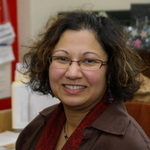 A transatlantic journey that began more than two decades ago has resulted in a new book by a Linfield College English professor.
A transatlantic journey that began more than two decades ago has resulted in a new book by a Linfield College English professor.
Reshmi Dutt-Ballerstadt, assistant professor of English at Linfield, began research for “The Postcolonial Citizen: The Intellectual Migrant” during her journey to the United States from Calcutta, India. She left family, friends and familiar surroundings to begin her studies at St. Catherine’s University in St. Paul, Minn.
Over the past decade, Dutt-Ballerstadt began transcribing her memories of life in the U.S. and India. The result is “The Postcolonial Citizen,” a literary work that addresses what happens to intellectual migrants when they move to the U.S., Canada and the United Kingdom from their former colonized countries.
The book became the third part of a postcolonial series by Peter Lang Publishing that exposes the complexity of migration and postcolonial citizenship. “The Postcolonial Citizen” draws upon Dutt-Ballerstadt’s expertise of multiple genres, establishing a new wave of writing that incorporates poetry, fiction, non-fiction and critical theory.
“When you move from one country to another, it complicates your understanding of what home is,” Dutt-Ballerstadt said. “I wanted to express what it means to belong neither here nor there, but in an in-between space.”
After Sept. 11, 2001, the meaning of being an intellectual migrant studying or working in the United States changed indefinitely, Dutt-Ballerstadt said.
“Suddenly migrants studying in the U.S. were no longer the people carrying books, but they became suspects,” she said. “The rise of the Patriot Act compromised everyone, as many innocent people were subject to being put under surveillance. This complicated one’s understanding of belonging in America – the land of the free.”
In the book, Dutt-Ballerstadt draws a historical parallel between horrific consequences of post-9/11 through a critique of the changed reaction to migrants who are no longer given the right of due process. The detention of individuals led to questions of individual rights and protection for those of migrant status.
“I wanted to bridge the gap through non-fiction and theory that explained the state of migration, while not losing my own voice,” Dutt-Ballerstadt said.
Dutt-Ballerstadt earned a B.A. from St. Catherine University and a Ph.D. from the University of Minnesota in Twin Cities Minn. Her academic focus is on postcolonial literature and theory, feminist studies and creative writing.
Through discussions with other intellectuals who left their homeland for an education in the West, Dutt-Ballerstadt found a shared commonality between the divergence of childhood memories and the present. Identity is a common theme throughout her book, and is extended to children of migrants, whom she calls “migrants by association.”
“So much of our human condition rests in knowing that there is a place that we can identify and belong to,” Dutt-Ballerstatdt said. “The longer we belong to these places, we develop a sense of familiarity that anchors who we are. As a migrant, though, that anchor is always going to be moving. That is the weight of life, I think, the heaviness of not knowing where one belongs. On one hand, there is lightness to knowing that not having an anchor allows freedom of movement, and on the other hand, not to be rooted is to throw into question a part of yourself.”

